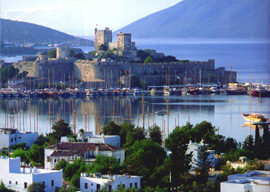
June 02, 2011

Bodrum, Turkey
I spent the Memorial Day weekend as a guest of Professor Hans-Hermann Hoppe’s Property and Freedom Society at their annual conference in Bodrum, Turkey. It was a wonderfully relaxing break, for which I am very much obliged to the good professor, his charming wife, and their co-organizers. I gave a talk about China and got to see some of Turkey (a country that was new to me), and I listened to some interesting and instructive lectures.
The PFS exists to help promote the economic and political libertarianism of Ludwig von Mises and Murray Rothbard. I was in Bodrum because Prof. Hoppe was kind enough to invite me, not because I am a particularly dogmatic disciple of those gents. I approve of them and their doctrines in a vague, general sort of way, as I approve of anything much to the right of the statist elephantiasis dominant in the modern West and which looks to be sailing into some great crisis in the near future.
On the other hand I have issues with libertarianism—with free trade, for instance, and with the open-borders dogma that too many libertarians (though not all the ones at Bodrum, perhaps not even a majority) cling to with religious zeal.
If I had to be marooned on a desert island with an economist, I’d much prefer it to be someone from the Austrian School, merely for their devotion to liberty; but like other economists, the Austrians seem to be uninterested in the crooked-timber aspect of human nature. (I might exempt some behavioral economists from that observation, but as Nikolay Gertchev demonstrated in his talk at Bodrum, the Austrians look askance at behavioral economics. The title of Nikolay’s forceful address was “Psychology Ain’t Economics.”)
I have never read anything by an economist—though I confess I have read far too little in the field—or heard any lecture by an economist that did not leave me thinking, “If this guy’s fundamental assumptions about human nature were true, human history would have been utterly different.”
Still, I suppose someone has to do economics, and the Austrians do it closer to my own political tastes than any others. There was even something calming about listening to their airy abstractions there at Bodrum. I came away feeling about the Austrian school somewhat the same way I feel about the Anglican Church: unable to assent wholeheartedly to the doctrines, but sympathetic at some deep level and wishing them well.
Back home in New York, I checked through the mail that had arrived in my absence. It included my subscription copy of The Economist. Page 87, “The Future of Mobility”:
Immigration is unpopular in rich countries because people overestimate its costs and underestimate its benefits. An influx of unskilled migrants may drag down the wages of unskilled natives, but this effect is “very small at most, and may be irrelevant”, according to a number of different studies.
Really? According to a number of different different studies, that is not true. So what is the non-economist to think? Perhaps the same thing he finds himself thinking when surveying the list of recent Nobel Prize winners in economics and noticing that for every large opinion that has won a Nobel, the contrary opinion has also won one. Real sciences don’t work like that.